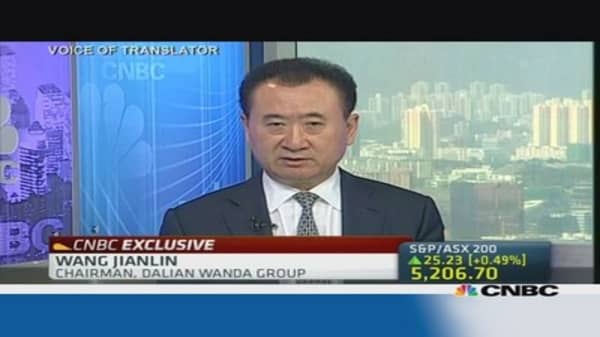China's property market is unlikely to take a hit from tighter liquidity when the Federal Reserve starts to taper its bond buying program, said Wang Jianlin, chairman of Dalian Wanda, a commercial property-to-karaoke-outlet conglomerate, and also China's richest man according to Forbes magazine.
"The tight liquidity will push up interest rates. But I don't think interest rates will go up by too much," Wang told CNBC in an exclusive interview, adding China's economy also doesn't move in lock-step with global markets.
"Because the profit margin for China's real estate industry is above the global average, a 1 percent to 2 percent rise in interest [rates] will have very limited impact on the profit margins of bigger property players," added Wang.
(Read more: China's property sector is booming even as economy slows)
China property developers' gross margins were around 34 percent in the first half of the year, UOB Kay Hian said in a recent report on the developers it covers. It noted the second half is usually stronger.
Wang also expects Beijing to re-focus its sector cooling measures, with property firms to soon be allowed to refinance after a nine-year hiatus on the segment's IPOs, in a move set to spur further development.
The Shanghai Securities Journal reported last week that detailed regulations on refinancing approval would be released in a couple of weeks at the soonest.
(Read more: China's Luxe Tastes Spur Deal to Buy Yacht Maker)
"China's economy now needs the property industry," Wang said. "Given the decline in export and investment, China's economy has turned from high growth to moderate growth with further downside risks."
Deutsche Bank also expects Beijing's drive toward urbanization to offer a long-term fillip to the property sector. The "new form" of urbanization will include developing big city-clusters, rather than just a few big cities, with more urban retail properties in Tier two, three and four cities, it said in a recent report.
"We expect domestic consumption to pick up given higher urbanization and higher productivity," the investment bank said.
(Read more: Red hot China property bonds falling out of favor)
Wang is also bullish on China's consumption outlook in the longer term. "This will be key for the country's future economic development," he said. Wang's Wanda Dalian conglomerate operates 57 department stores. "By 2015, China is set to become the largest consumer market in the world at over CNY30 trillion ($4.9 trillion)."
—By CNBC.Com's Leslie Shaffer; Follow her on Twitter @LeslieShaffer1




